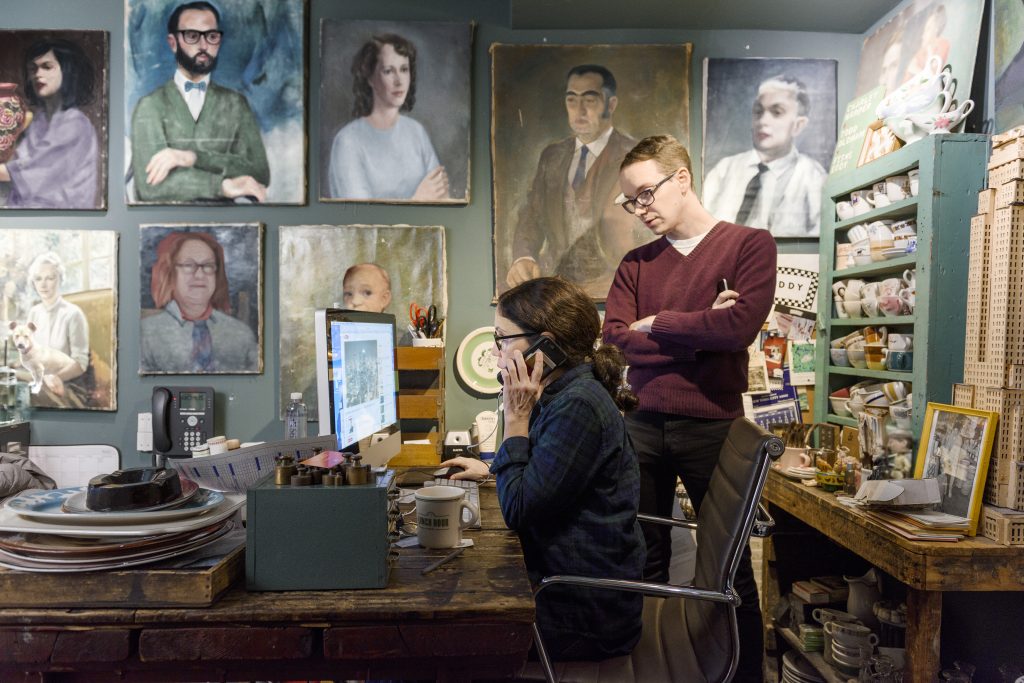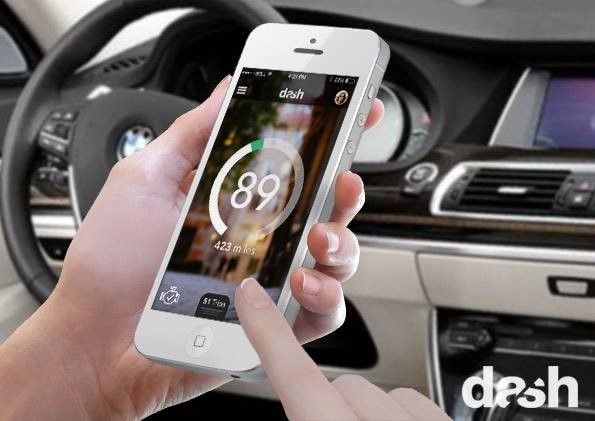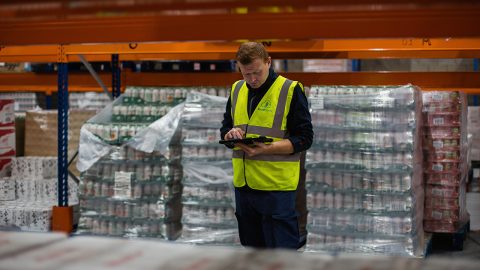From cool dishes to smart driving, small businesses rely on Microsoft tools for growth and collaboration
There’s no shortage of eclectic housewares shops in New York City, but Fishs Eddy stands out as an institution. Named after an upstate New York hamlet, the longtime store is a mix of vintage elegance and quirky Americana, with its classic china, Jadeite cake stands, “Brooklynese cawffee” mugs and dish towels of Teddy Roosevelt high-fiving a bear.
Good design and quality have long been hallmarks of Fishs Eddy, but much has changed in the 30 years since Julie Gaines and David Lenovitz opened their store and sold cool, old dishes.
Their once tiny storefront is now a bustling emporium with e-commerce and wholesale services. Digital accounting and point-of-sale systems do the jobs once held by a tackle box cash register and a notepad. A warehouse and modern delivery truck have replaced the couple’s dented pickup that once hauled antiques. And Microsoft tools have become an integral part of helping Fishs Eddy grow, collaborate and transform its business.
“Microsoft Office has allowed us to spend more time working on our business and not worrying about software,” says Noah Lenovitz, Fishs Eddy chief operating officer and partner. The company of roughly 45 employees uses Office apps, Exchange and Skype, and is looking to move to Office 365.

Microsoft technologies are empowering small and midsize businesses around the world, helping them grow, innovate and reach more customers. From retail stores to software startups, businesses are leveraging data, collaborating efficiently and creating modern workplaces with Microsoft’s cloud-based tools, including Office 365, Dynamics and other business solutions.
Located in New York’s Flatiron District, Fishs Eddy moved to Microsoft Exchange after Hurricane Sandy wiped out power to its store, mail server and warehouse in 2012. With the store closed for about a week, the company realized it needed to centralize its data and use cloud-based tools for mobile productivity. It needed a reliable, more secure email system. It migrated to Exchange and adopted Office.
“Hurricane Sandy was a wake-up call for us,” says Lenovitz. “It was really hard for us to get back online, and we went back to old-fashioned phone calls and pen and paper.”
Fishs Eddy now uses Outlook and Exchange for shared calendars and group emails, and Excel and Word for analytics and writing. It uses OneDrive and Skype for collaborating with team members, designers and vendors on everything from sketches to product samples. As the company expands into more markets and works with more retailers, data synced across devices makes working on the go a cinch.
“When someone asks me for a file, I used to say, ‘I have to get back to my computer to get it.’ But now I have access to all the files,” Lenovitz says. “The great thing about Office, whether you’re using Word or Outlook or Excel, is the compatibility with all the products and the ability to integrate with our point-of-sale and accounting system.”
Dash: making any car a ‘smart car’

New York startup Dash, maker of a connected car platform, also relies on Microsoft tools as it helps people drive smarter and more safely.
Founded in 2012, Dash tracks hundreds of data points from a car’s engine, a smartphone sensor and about traffic and weather to create an assistant that can give drivers real-time information on car performance, trip mileage and driving conditions. Dash can tell you if you’re braking too hard or accelerating too fast; where the cheapest, closest gas is; when it’s time to rotate your tires and what the “check engine” light means.
“It’s a product that emphasizes how can we make driving smarter and in turn safer, greener and more affordable, helping people save money on things like gas, repairs, maintenance and insurance,” says Dash Co-founder Jamyn Edis.
To grow Dash’s line of products, Edis does a lot of product pitches, investor presentations and conference talks. His tool of choice? PowerPoint. “I’ve used it for 20 years on and off, and it’s only gotten better and better,” he says.
To make sense of the massive amounts of data that Dash collects, the company uses Excel. Edis recently explored Excel’s Power Map, a 3D data visualization tool, to create an interactive, customizable heat map of local traffic. He was astounded at how fast and easy it was to do. “I kind of fell off my chair,” he says of the first time he saw a demo of the tool.
Nearly 300,000 drivers have downloaded Dash, which uses a small device that fits under the steering wheel to track engine data. The company is now building products for data analytics, commercial trucking fleets and usage-based insurance companies. The New York City Department of Transportation is also using Dash to track driving patterns in a program to improve traffic management, in which volunteers can qualify for an insurance discount if Dash’s algorithm determines they’re a safe driver.
To build its products and collaborate with partners in Europe and investors in Russia and Japan, Dash uses Skype.
“We have to be available remotely and work virtually, and Skype allows us to do that in a really seamless fashion,” Edis says, adding that he finds Skype video essential for working well with others.
“All of the Office tools, from a productivity perspective — we couldn’t work without them.”
Top image: Fishs Eddy CEO Julie Gaines, left, and assistant Matthew O’Brien.










